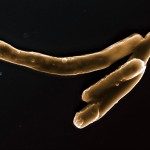Lien vers Pubmed [PMID] – 18082570
Hum. Immunol. 2007 Nov;68(11):908-12
The C-type lectin DC-SIGN (CD209) is an important pathogen recognition receptor of the innate immune system. Recent studies showed that DC-SIGN is the major receptor of Mycobacterium tuberculosis on human dendritic cells and that polymorphisms in the DC-SIGN promoter region are associated with susceptibility to tuberculosis. In this light, we aimed to study the potential implication of DC-SIGN genetic variation in the predisposition to tuberculosis in a group of Tunisian patients. We thus performed an association study comprising 138 tuberculosis patients and 140 healthy controls. Sequencing of the DC-SIGN promoter region detected four polymorphisms (-939, -871, -601, and -336), but no differences in their allelic distribution were observed between the two groups. In addition, the analysis of length variation in the DC-SIGN neck region indicated extremely low levels of polymorphisms and, again, no differences between patients and controls. Our data showed therefore that neither promoter variants nor length variation in the neck region of DC-SIGN is associated with susceptibility to tuberculosis in Tunisian patients.



